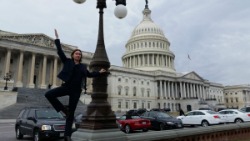Last month, MUIH’s Steffany Moonaz, Ph.D., Assistant Director for Academic Research, returned to Capitol Hill to lead a monthly meditation session for members of Congress and their staffers. This ongoing initiative was developed by Rep. Tim Ryan (OH), a champion of mindfulness and meditation practice. We recently interviewed Dr. Moonaz about her experience, and the importance mindful-based practices in today’s political landscape.
How did you get started facilitating meditation sessions for Congress?
This is an initiative that was started by Rep. Tim Ryan based on his own experiences with meditation and his belief that people in every segment of government, from local to national, might find some benefit from mindfulness training. So he began bringing in meditation professionals to lead sessions that were open to all members of Congress and their staff. I was invited two years ago after Dr. Thomas Nassif, who is adjunct faculty here at MUIH, had led a session and then reached out to Ryan’s office to recommend me. I’ve been fortunate to go and do this several times since then. There is a dedicated space in one of the congressional buildings where members of Congress and their staffers can go to meditate every week, and once a month a teacher comes in to lead a guided meditation session.
How do you lead the guided meditation sessions? Do you incorporate different methods into each session?
There are certain parameters as to what is allowed and not allowed in the sessions in order to keep it as inclusive and accessible as possible. However the styles of meditation vary and whoever leads a session can otherwise choose the approach that they want to use. I’ve used various meditation styles, such as concentrative meditation, choosing a single point of focus and holding attention on that focus. I’ve also used mindfulness meditation, attending to what’s happening in this moment through sensation. Additionally, I’ve used loving-kindness meditation; I think this one is particularly important in politics because it uses the intention of loving kindness, directed toward ourselves, those we love, and also those who challenge us in some way. I also try to include some of the embodied practices from yoga, like progressive relaxation, breath awareness, and movement.
What are some basic mindfulness and meditation practices you encourage people to turn to in between meditation sessions?
 |
There are many. One would be noticing the quality of the breath in times of stress and being aware of whether or not the breath is deep and full, and then using the breath in order to elicit a state of calm. The same is true with regard to noticing tension in the body. Paying attention and making adjustments to release tension in the body is vital because the mind and the body are so inter-related. Therefore, if one can be aware of how stress is affecting the body and state of mind, there is an opportunity to intervene and disrupt the pattern of stress.
How do you think meditation supports members of Congress and their staffers as they navigate through a very high-stress environment with a sense of clear-mindedness?
I’ve been doing this for a few years now and whenever I mention to anyone that I lead meditation sessions for Congress the universal response is, “Wow, they really need it!” That was true in 2015 and it’s true now. Tim Ryan once mentioned to me, “It’s great to have people in Congress meditating, but it would be even better to have meditators in Congress.” The difference is that meditation can be something that you do every so often, or meditation can be part of who you are. It is said that meditation creates a space between the stimulus and the response. So putting that in the context of interactions among policy-makers, when a situation becomes heated they can react immediately out of emotion or habit, or they can pause and use that space to make a different choice. Mindfulness allows us to consciously choose how to respond rather than just react. Another important thing to know about meditation is that it doesn’t make you soft or uninvolved or distant. Mindfulness practice provides an opportunity to be even more effective in doing the things that matter to you because your choices are more deliberate.
How are the people who attend these sessions responding?
The meditation and mindfulness sessions are overwhelmingly appreciated by the people who attend. We have people coming back week after week who have never meditated before and now practice it regularly. Every time I’m there people come up to me afterwards to express just how grateful they are for my visit. If this is something that I’m able to give that might impact the processes in our government in a positive way even just a little bit, then I’m grateful for the opportunity to offer this service to the country.